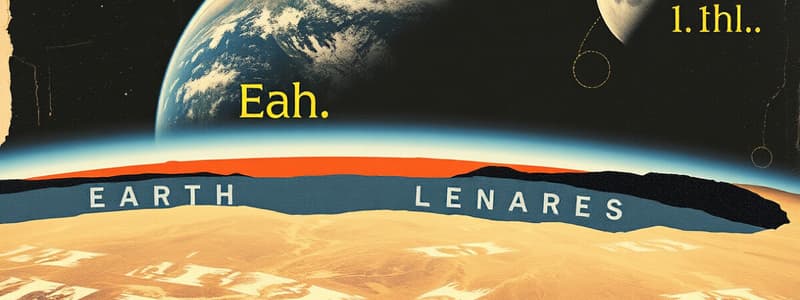Podcast
Questions and Answers
What is the atmosphere?
What is the atmosphere?
The atmosphere refers to the layer of gases that surrounds the Earth.
Which layer is the lowest layer of Earth's atmosphere?
Which layer is the lowest layer of Earth's atmosphere?
- Stratosphere
- Thermosphere
- Troposphere (correct)
- Mesosphere
What is the altitude range of the stratosphere?
What is the altitude range of the stratosphere?
Approximately 12 kilometers to 50 kilometers above the Earth's surface.
What occurs in the mesosphere?
What occurs in the mesosphere?
What characterizes the thermosphere?
What characterizes the thermosphere?
The exosphere is the innermost layer of Earth's atmosphere.
The exosphere is the innermost layer of Earth's atmosphere.
What does geosphere refer to?
What does geosphere refer to?
The outermost layer of the Earth is called the ______.
The outermost layer of the Earth is called the ______.
Which layer of the Earth is the thickest?
Which layer of the Earth is the thickest?
Match the following types of Earth's crust:
Match the following types of Earth's crust:
What is the composition of the outer core?
What is the composition of the outer core?
Flashcards are hidden until you start studying
Study Notes
Earth's Atmosphere
- The atmosphere is a layer of gases surrounding the Earth, composed of 78% nitrogen and 21% oxygen, with 1% consisting of argon, carbon dioxide, carbon monoxide, ozone, and inert gases.
Layers of Earth's Atmosphere
- Troposphere: The lowest layer, extending up to 12 kilometers; where weather occurs and where humans live. Supports air travel for balloons and airplanes.
- Stratosphere: Extends from 12 kilometers to 50 kilometers; contains the ozone layer, which protects the Earth from harmful UV radiation.
- Mesosphere: Ranges from 50 kilometers to 85 kilometers; characterized by thin air and low pressure; meteors burn up here, creating shooting stars.
- Thermosphere: Starts at 85 kilometers with no defined upper boundary; contains individual gas molecules; site of auroras (Northern and Southern Lights).
- Exosphere: The outermost layer, transitioning into space; home to satellites and man-made objects in Earth's orbit.
Geosphere
- The geosphere is the solid component of the Earth, comprising rocks, minerals, surface landforms, and the processes shaping them.
Layers of the Geosphere
- Crust: The outermost and thinnest layer, ranging from 5 to 70 kilometers in thickness; divided into continental crust and oceanic crust.
- Continental Crust: Thicker, averaging 35 kilometers, found under continents.
- Oceanic Crust: Thinner, averaging 7 kilometers, beneath ocean basins.
- Mantle: The thickest layer, extending to about 2,900 kilometers; split into upper and lower sections.
- Upper Mantle: Relatively rigid; contains the asthenosphere, allowing tectonic plate movement.
- Lower Mantle: Solid, aiding in convection and heat transfer within the Earth.
- Core: Innermost layer, consisting of the outer core and inner core.
- Outer Core: Liquid layer, primarily made of molten iron and nickel.
- Inner Core: Solid center of the Earth, composed of iron and nickel under extreme temperatures and pressures.
Studying That Suits You
Use AI to generate personalized quizzes and flashcards to suit your learning preferences.




